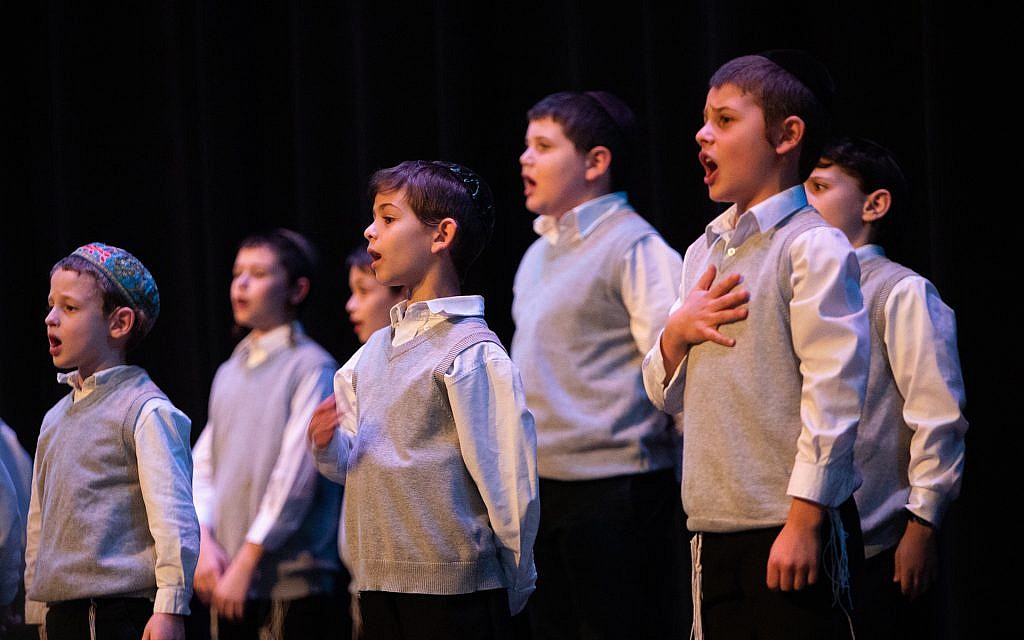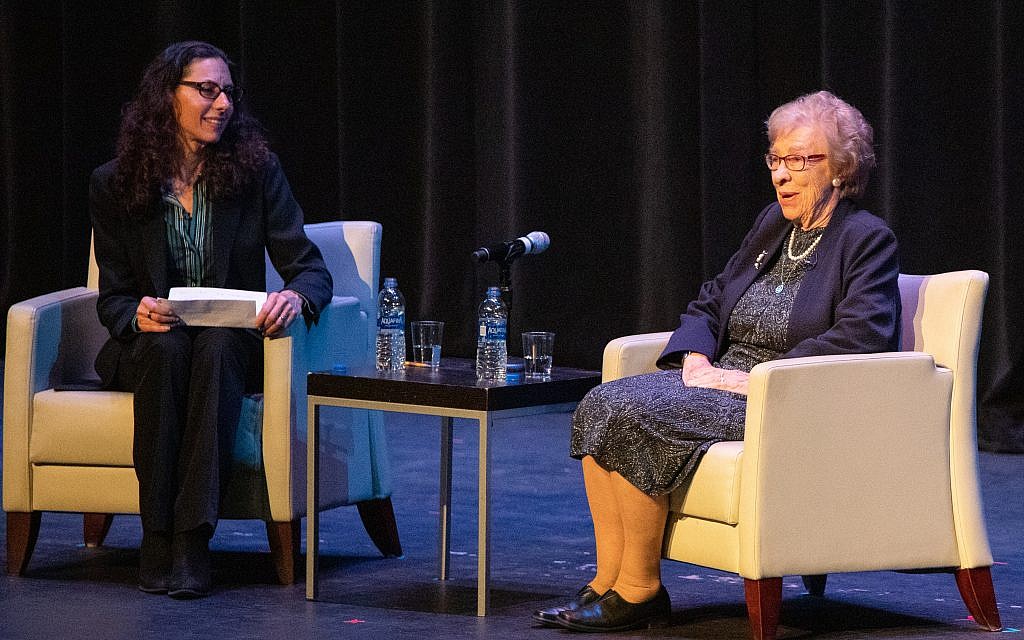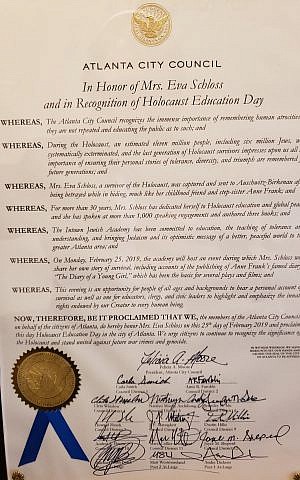Schloss Shares Holocaust Story, Anne Frank Friendship
Eva Schloss, Holocaust survivor, author and stepsister to Anne Frank, shared her memories and ultimately her journey out of Auschwitz to a packed Georgia Tech auditorium.
Eva Schloss, Holocaust survivor, author and stepsister to Anne Frank, shared her Holocaust story, her memories and ultimately her journey out of Auschwitz to a packed Georgia Tech auditorium Monday night.
The event, hosted by Intown Jewish Academy, attracted hundreds of Jewish Atlantans, Tech students, educators and others, filling nearly every seat at Tech’s Ferst Center for the Arts.
Rabbi Ari Sollish, founder and director of the school, delivered the opening remarks.
He reminded the crowd that there were two sets of stone tablets in the Ark of the Covenant, one whole and one broken by Moses. He likened those tablets to the struggles of Schloss and Frank.
“We recall not only the lives lived fully and tranquilly, but also those tragically cut short. … Those too are holy. Those too must be remembered,” Sollish said.
Atlanta City Council President Felicia A. Moore was next to speak, reading from a Feb. 25 proclamation recognizing the life and work of Eva Schloss, signed by herself, the 15 other city council members and Atlanta Mayor Keisha Lance Bottoms. Lance Bottoms also sent a letter, which Sollish read aloud.

The Atlanta Jewish Boys Choir shocked the crowd, taking the stage alongside Rabbi Jake, performing “Ani Maamin” and “Am Yisrael Chai.”
Then it was time for the main event. Schloss took the stage alongside Atlanta Interfaith Broadcasters Producer Audrey Galex, who directed the conversation with brief questions, allowing Schloss to share her story.
Schloss began before the war itself, with the story of her parents first meeting — it seemed to be love at first sight — and their flight from Austria to Belgium, where she first met Frank.
“She was so full of stories, … and by 11 she was already interested in boys. When I told her I had a brother, she asked, ‘When can I meet him?’” Schloss said, drawing laughter from the crowd. “I looked up to her because I realized she had no inhibitions and was very free.”
She recounted the Nazi invasion and the increasing danger as people went missing. At that point, her family went into hiding, Schloss with her mother, and her father and brother Heinz, separately, because apartments were small, and it was better to play the odds.
Like many Jewish families, Schloss’s was betrayed in 1942, in their case by a Dutch nurse, ultimately leading to their capture, detention and trip to Auschwitz.

Schloss described the first selection, as infamous Nazi doctor Josef Mengele chose based on appearance alone who would live and who would die.
She then told how she got typhoid from drinking unclean water, and her mother’s desire for her to go to the camp’s hospital, a ruse for Mengele to experiment on girls, and how a cousin stopped them from going and snuck out what she needed in order to recover.
In one of the more heartbreaking moments of her story, Schloss detailed how another selection was made, and she was forced to watch as her mother was assigned to the wrong side. Eva believed her dead, only to find out later that the same cousin, Mimi, who had helped her, had managed to save her mother.
“My mother had said, ‘I’m ready to die, but please let my children survive,’” Schloss said. “She was 40 years old.”
While she and her mother survived, her brother and father were not so lucky, as she would find out later running into Otto Frank, Anne’s father, once again.
“The first question Otto asked me was if I’d seen his wife or his daughter, and I hadn’t, and he told me he’d seen my brother and father, but they’d gone with the Germans,” she said. “At that point I didn’t know about the death marches.”

She also detailed her process of returning to a semi-normal world after the Russian liberation of Auschwitz. She began working as a photographer while still in school and met her late husband, initially rejecting his proposal so she could return home to her mother. But she later accepted it after learning Otto and her mother had also fallen for each other.
She concluded by explaining that, while she is not very religious, she makes an effort to go to synagogue on Saturdays when her busy schedule doesn’t keep her occupied.
“That is what we need: One day of calm and quiet and reflection. We have to be more considerate and think of other people,” Schloss said. “We have become quite rich and yet there are so many people in the street, … We have been given a wonderful planet rich enough to feed everybody, and we should really look around more.”




comments